Wednesday, September 4, 2024, 10:52
There is a possibility that the year will end with a record number of illegal immigrants arriving in Spain, especially in the Canary Islands and Ceuta. And what is a problem as obvious as it is urgent, especially in those places where the reception infrastructure burst some time ago, becomes a weapon for politicians, who say and retract what suits them at any given moment. Francisco Candil, deputy minister of Social Welfare of the Canary Islands Government, is honest: “Politics is not up to the task of dealing with this situation, which has been taken as just another matter to hurl all kinds of insults, ignoring the fact that it is a humanitarian crisis and that as such it must be solved.”
Meanwhile, the drama continues and, even more worrying, no one is looking for a solution to the root of the problem, which is not found so much in Europe as in Africa. This is well explained by the social anthropologist Jesús Prieto Mendaza, who calls for investments at the source to develop the continent and prevent flight from being the only hope for a better life, while recognizing the problem of integration represented by irregular immigrants, especially unaccompanied minors. “Europe cannot accommodate all the Africans who want to enter it,” he says in a sentence that seems like common sense.
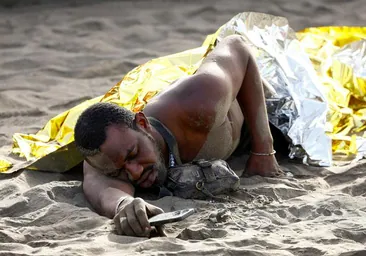
Unfortunately, this complex situation is only addressed from the simplistic perspective of ideological extremes: from the racist hatred of the far right and the “Disney do-goodism” of the far left. This is happening all over Europe and partly explains the rise of the former, especially because it is the only one that promises solutions – even if they are impractical – while the latter limits itself to labelling as fascist anyone who shows their displeasure – or even mere concern – about the situation.
Meanwhile, development cooperation in Africa is failing and only aims to patch things up, because the endemic corruption of governments in developing countries, the business that the Third Sector has often become, and a change in the world order that promotes the prominence of China on the continent do not allow us to go any further.
That is why today we are focusing on this international situation that, once again, affects us even though we think it is still far away.
These are the two perspectives we will address:
-

Mission impossible
Irregular migration has no solution
The West is rich because it has conquered and plundered many territories. And for that very reason, it now has the obligation to welcome those who leave there in search of a better life and to develop the countries it has destabilized in order to extract all kinds of raw materials.
It is a statement that is often heard in the field of NGOs and institutions dedicated to global development. And a glance at any history book is enough to find it difficult to refute. Moreover, experts agree that the problem of irregular immigration will only be solved when it is not necessary to flee from anywhere to enjoy a decent life, which also seems logical. However, achieving this goal is much more complicated than it is often portrayed. And, to a large extent, this is due to the endemic corruption that weighs down developing countries and the business that the Third Sector has also become.
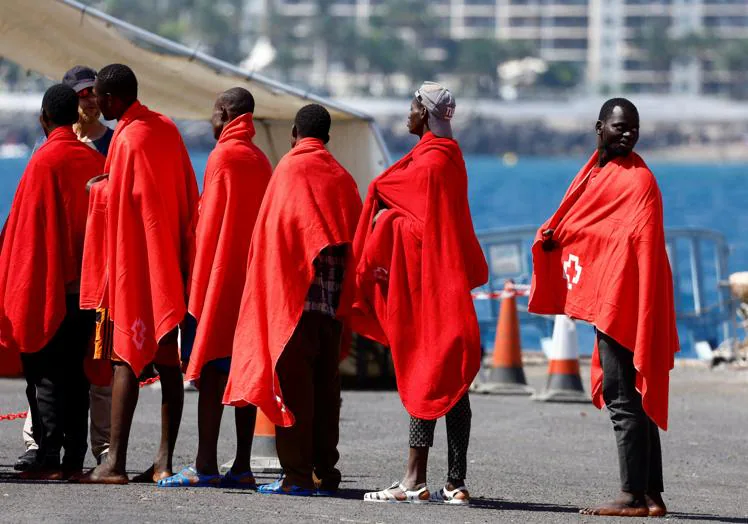
Arrivals by sea account for only 40% of all irregular arrivals.
Reuters
I have had the opportunity to see first-hand a multitude of development projects throughout Asia: from reconstruction programmes after earthquakes and tsunamis such as those in Pakistan or South-East Asia, to long-term plans to eliminate deep-rooted social ills such as malnutrition in Laos, gender-based violence in India, or school failure in East Timor. In all of them there is always a laudable objective, and no one doubts that these projects save some lives and improve others. But the results, especially when taken into account the cost-benefit, are often questionable. And they are totally insufficient to solve structural problems.
Organizations – especially UN agencies – often stress that their work must always be approved, coordinated and supervised by local governments, which seems reasonable. The problem arises when these leaders see in these projects an opportunity to fatten their wallets, when countries develop a pathological dependence on foreign funds, and when NGOs generate a business that is not always justified and ends up creating their own clientele networks. It is the old ‘teach them to fish, don’t give them fish’ approach.
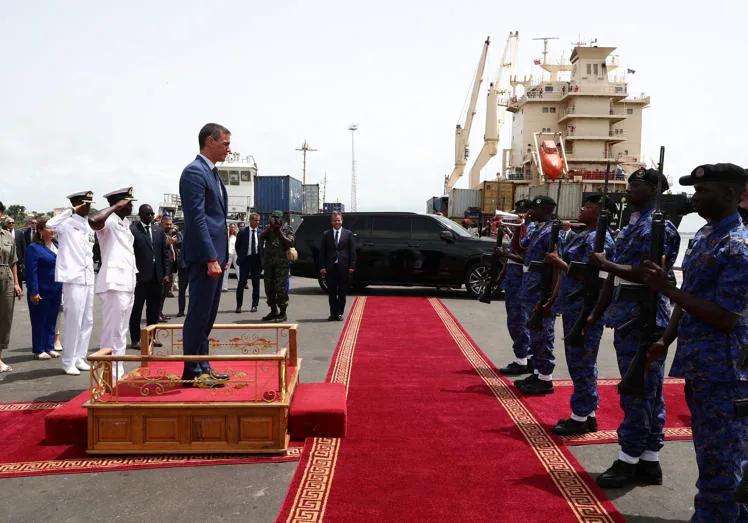
Pedro Sánchez during his recent visit to Gambia.
AFP
It is true that socio-economic indicators are also improving in Africa as a whole. But one might wonder whether they would not have done so with fewer of these cooperation programmes, or by applying different recipes. We may soon see this, because the continent is now experiencing a time of change. The traditional colonial powers are retreating – especially France – leaving room for emerging powers such as China, which is arriving with a very different mentality. More investment than charity, with the expectations of return and the demand for work that this entails. Beijing emphasises that the Asian giant can give a great boost to the development of the continent, since it builds the basic infrastructures without which it cannot exist.
China is already sub-Saharan Africa’s largest trading partner. “Walking hand in hand towards modernity” is the motto of the Sino-African summit taking place between today and Friday in Beijing with representatives from 50 African countries. They should take note, because the Chinese know what they are talking about. After all, they have staged the greatest economic miracle in history without much foreign help.
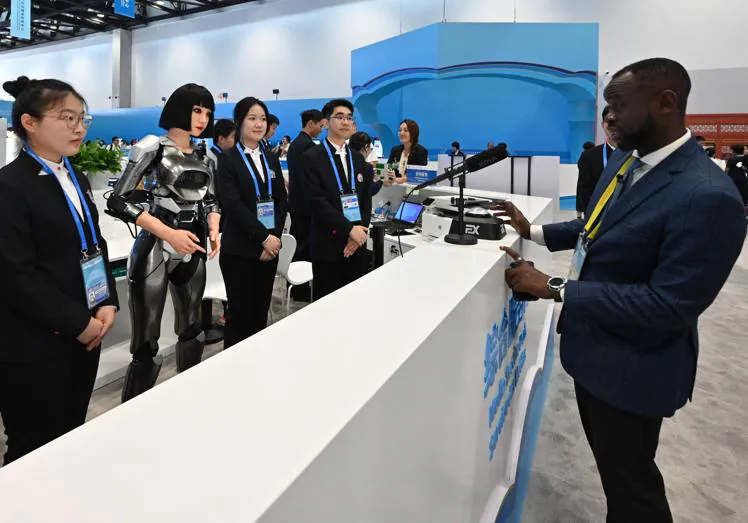
One of the attendees at the Sino-African summit which kicks off today in Beijing.
AFP
Russia, on the other hand, is more interested in shooting, supporting dictators and collecting raw materials from Africa. Together with China, they have in common with most African governments their contempt for democratic values and human rights, and their tendency to hand over money under the table. Perhaps that is why they get along well. Unfortunately, the population does not seem to be benefiting from this new world order, which is why, coupled with growing political and military instability in the Sahel, the number of flights to Europe is increasing.
It is the ideal breeding ground for irregular migration. Mendaza argues that the only solution is to develop Africa, and he is right. The problem is that this is an impossible mission, at least in the medium term and with Western recipes. It is an objective that will not be achieved with foreign interference or victimizing speeches, but by creating the appropriate environment for the entrepreneurial drive of the youngest population on the planet to flourish and for their governments to respond to the interests of the majority and be held accountable if they do not. Yes, I know that is easy to say.
-
-kPcG-U2201138297409hJC-80x80@RC.png)
Elections in Germany
The far right wins in Germany and no one is surprised
The far right is on the rise across Europe, and Germany is the latest country where it has become more and more obvious: AfD has become the leading political force in Thuringia and second in Saxony. This has not surprised anyone, even though it is the first time since the end of the Second World War that a party of this ideology has won an election in Germany. It is true that it will not govern due to the cordon sanitaire imposed by the other parties, but it is increasingly clear that this measure is only temporarily successful.
If the reasons behind this rise are not addressed, its strength will continue to grow until there is no cordon to contain it. This has happened in France, Sweden and Slovakia, and if the far right has lost some of what it has gained in the last decade in places like Denmark, it has only been because other, more centrist parties have adopted some of its policies.
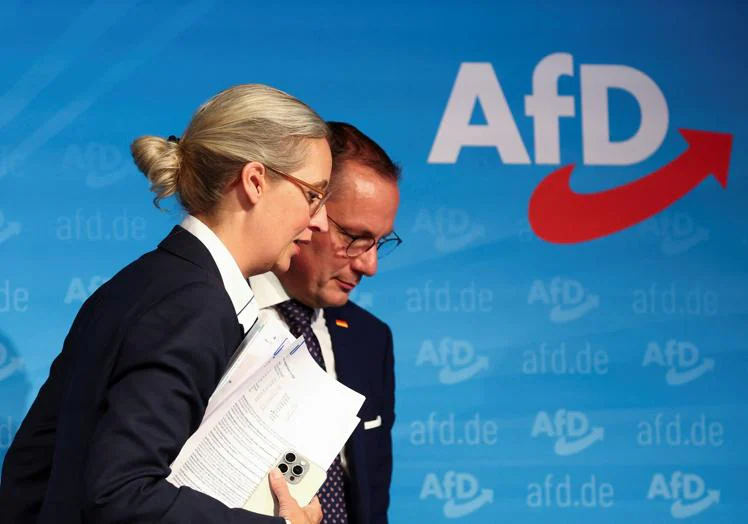
AfD leaders Alice Weidel and Tino Chrupalla
Reuters
In Germany, it is surprising that 38% of voters between 18 and 24 years of age have given their support to the AfD, twice as many as to the left-wing Die Linke. And analysts agree that immigration is one of the main reasons for this growth. With almost 19% of its population being migrants – and the second country with the highest absolute number, only behind the United States – it is one of the European states with the highest rate of foreign-born inhabitants. But it is also one of those that has been struggling for the longest time with its integration, especially with those of Turkish origin. It is not as new a phenomenon as in Spain.
The fact that tensions are rising in countries with a longer tradition of migration, such as France and the United Kingdom, is what paints a dark picture in terms of the ability to create a multicultural society that lives together in peace. Scandinavia is a good example: the problems are substantially more acute in Sweden, which has opened up to refugees and already has a 20% migrant population, than in neighbouring Norway and Finland, where the population is more homogeneous.
The most pessimistic say that Spain is heading towards the tension experienced by France, while others point out that the greater weight of Latin American migration – with which it shares more values and customs – will prevent this from happening. Unfortunately, the magic formula for creating that happy multicultural Arcadia that the developed world yearns for has not yet been found.
That’s all for today. I hope I’ve explained to you some of what’s happening in the world. If you’re subscribed, you’ll receive this newsletter every Wednesday in your email. And, if you like it, it will be very helpful if you share it and recommend it.
#impossible #stop #illegal #immigration #Diario #Vasco